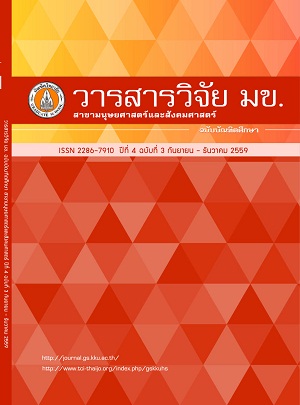การพัฒนากิจกรรมการเรียนรู้คณิตศาสตร์ ตามแนวคิดทฤษฎีคอนสตรัคติวิสต์ที่เน้นกระบวนการแก้ปัญหาของโพลยา เรื่อง บทประยุกต์ ชั้นประถมศึกษาปีที่ 5
บทคัดย่อ
การวิจัยครั้งนี้มีวัตถุประสงค์เพื่อ 1) พัฒนากิจกรรมการเรียนรู้คณิตศาสตร์ ตามแนวคิดทฤษฏีคอนสตรัคติวิสต์ที่เน้นกระบวนการแก้ปัญหาของโพลยา เรื่อง บทประยุกต์ ชั้นประถมศึกษาปีที่ 5 2) พัฒนาผลสัมฤทธิ์ทางการเรียนคณิตศาสตร์ ให้นักเรียนมีผลสัมฤทธิ์ทางการเรียนเฉลี่ยร้อยละ 70 และนักเรียนจำนวนไม่น้อยกว่าร้อยละ 70 ของนักเรียนทั้งหมดมีผลสัมฤทธิ์ทางการเรียนตั้งแต่ร้อยละ 70 ขึ้นไป 3) ศึกษาทักษะการแก้ปัญหาของนักเรียนจากกิจกรรมการเรียนรู้คณิตศาสตร์ กลุ่มเป้าหมายเป็นนักเรียนชั้นประถมศึกษาปีที่ 5 โรงเรียนวังบงน้อยวิทยา จำนวน
15 คน ใช้การวิจัยเชิงปฏิบัติการ ประกอบไปด้วย 3 วงจร เครื่องมือที่ใช้ในการวิจัย คือ 1) เครื่องมือที่ใช้ในการทดลองปฏิบัติ ประกอบด้วย แผนการจัดการเรียนรู้คณิตศาสตร์ 2) เครื่องมือที่ใช้ในการสะท้อนผลการปฏิบัติ คือ แบบบันทึกการจัดกิจกรรมและแบบบันทึกการสังเกตของผู้ช่วยวิจัย 3) เครื่องมือที่ใช้ในการประเมินประสิทธิภาพการจัดการเรียนรู้ คือ แบบทดสอบท้ายบท การวิเคราะห์ข้อมูลใช้ค่าเฉลี่ย ร้อยละ และสรุปเป็นความเรียงผลการวิจัยพบว่า นักเรียนมีผลสัมฤทธิ์ทางการเรียนเฉลี่ยร้อยละ77.83 และมีจำนวนนักเรียนร้อยละ 93.33 ของจำนวนนักเรียนทั้งหมด มีผลสัมฤทธิ์ทางการเรียนตั้งแต่ร้อยละ 70 ขึ้นไป และทักษะการแก้ปัญหามีคะแนนเฉลี่ยร้อยละ 90.70, 78.00, 80.70, 77.30 ดังนี้ ขั้นทำความเข้าใจปัญหา ขั้นวางแผนการแก้ปัญหา ขั้นดำเนินการตามแผน ขั้นมองย้อนกลับ ตามลำดับ
The objectives of this research were to 1) Develop mathematics learning activities based on Constructivist theory emphasizing and Polya’s problem solving process on Application for Prathomsuksa 5, 2) develop students’ mathematics learning achievement to meet the criteria of not less than 70 percent of students can gain achievement score of 70 percent and higher, and 3) study problem solving skills of students. The target group consisted of fifteen grade 5 students from Wangbong-noi Wittaya. This study is an action research conducted in three cycles. The tools used in this research were classified into 3 categories namely 1) The Experimental tool comprised of mathematics lesson plans . 2) The tools used to reflect the action research. 3) The tools used for evaluating effectiveness of learning activities. The data was analyzed by means and percentages and summarized report in descriptive manner. Research findings were as follows The students learning achievement showed the average scores at 77.83 percent. Of all students, 93.33 percent of them gained learning achievement scores from 70 percent and higher. The students gained the average scores of problem solving skills at 90.70, 78.00, 80.70 and 77.30 on the following steps: Understanding the problem, devising the plan, carrying out as planned and looking back .




